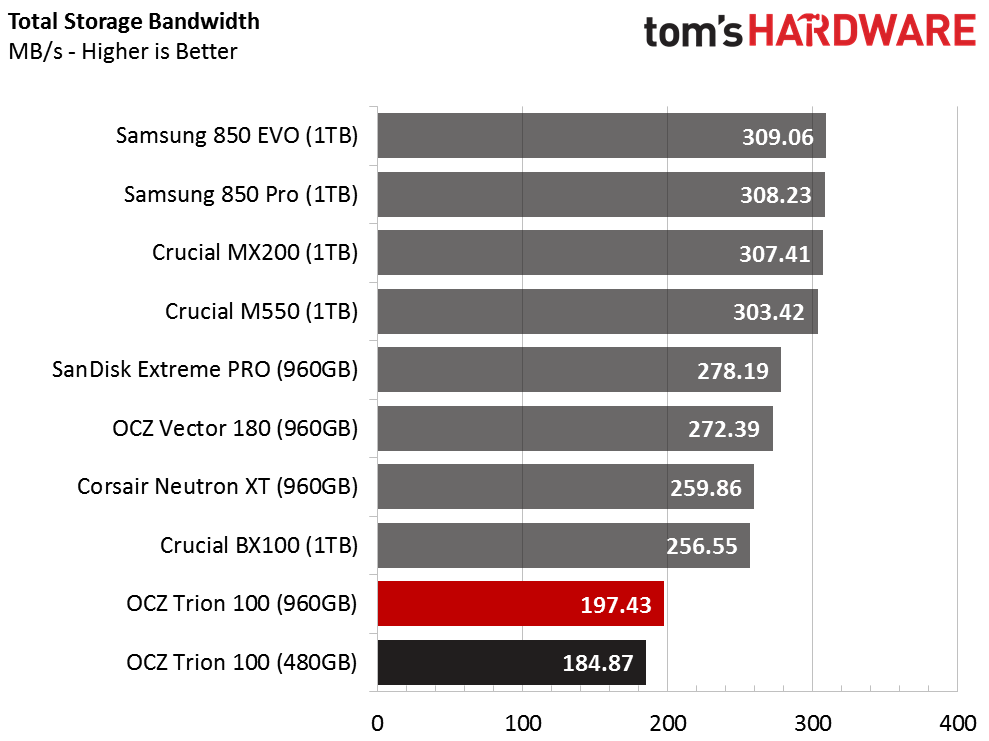OCZ Trion 100 Series SSD Review
Now firmly in the Toshiba camp, OCZ's Trion 100 Series is the first retail product to ship with Toshiba's new A19 TLC NAND flash.
Why you can trust Tom's Hardware
Total Storage Bandwidth
This chart comes from averaging the numbers and presenting our results as throughput. Not surprisingly, based on the data we've seen, the two Trion 100s show up at the bottom. Our issue is that OCZ wants this product family to compete against Samsung's 850 EVO, which leads the client workload charts. The transition to TLC isn't the end of the world, so long as companies leverage pSLC effectively.
Get Tom's Hardware's best news and in-depth reviews, straight to your inbox.
Current page: Total Storage Bandwidth
Prev Page PCMark 8 Real-World Software Performance Next Page PCMark 8 Advanced Workload Performance
Chris Ramseyer was a senior contributing editor for Tom's Hardware. He tested and reviewed consumer storage.
-
jedik1 "Juliet in the eyes of Romeo"....lol....you guys really need to find better pickup lines.Reply
IMO. SSD market is overcrowded at the moment. I think better emphasis should not be in performance as more or less all of them perform pretty good. I think more emphasis should be on cost reduction alone. Only when SSDs will be like 1TB~$80-$100 then only we can see wider adoption of SSDs. -
JPNpower This drive is perfect and the ideal answer to those low budget builds that frequent the Toms forums. Yes, you can afford an SSD, Yes you can keep that 2/3 year old cheap computer and make it faster... no excuses now.Reply -
"most of it ended up in devices with low endurance like thumb drives and SD cards"Reply
Can you please elaborate? I was under the impression that thumb drives and SD cards mostly used MLC or eMLC NAND?
I don't like these 19 and 16 nm chips. You need over-provision and complex ECC algorithms just to correct all the errors the drive outputs after a year or so. The industry is going in the wrong direction, IMO. Samsung has 40 nm 3D NAND, but it would be even better to have that at 65 nm. I don't mind paying 2-3x the price if the endurance is an order of magnitude better.
Even with RAM, do we really need more capacity over having ECC? Solar flares happen all the time. Data keeps growing and becoming more valuable, this is a real issue. Most people don't even checksum their data!
I guess if you're playing video games it doesn't matter. But content creators should care. -
JPNpower Reply16226457 said:I'm surprised OCZ still exists
It doesn't really. It's a company that's been butchered, restructured, and relaunched by Toshiba so really it's quite a new company. -
JPNpower Reply16219463 said:"most of it ended up in devices with low endurance like thumb drives and SD cards"
Can you please elaborate? I was under the impression that thumb drives and SD cards mostly used MLC or eMLC NAND?
I don't like these 19 and 16 nm chips. You need over-provision and complex ECC algorithms just to correct all the errors the drive outputs after a year or so. The industry is going in the wrong direction, IMO. Samsung has 40 nm 3D NAND, but it would be even better to have that at 65 nm. I don't mind paying 2-3x the price if the endurance is an order of magnitude better.
Even with RAM, do we really need more capacity over having ECC? Solar flares happen all the time. Data keeps growing and becoming more valuable, this is a real issue. Most people don't even checksum their data!
I guess if you're playing video games it doesn't matter. But content creators should care.
That's what enterprise products are for. They provide better stability and probably endurance as well. OCZ is a massive player in this field so you should check out their enterprise products. The semi-enterprise Vector 180 is pretty popular. -
Phuntasm I really hope this isn't meant to completely replace the Vertex line. Vertex were top of the line performers, while this is just a mediocre blaaah. "It's an SSD." I want to see a Vertex-like headliner, something to compete with the 850 Pro. Either way, where are them PCI-e uber-SSDs?Reply -
JPNpower Reply16269842 said:I really hope this isn't meant to completely replace the Vertex line. Vertex were top of the line performers, while this is just a mediocre blaaah. "It's an SSD." I want to see a Vertex-like headliner, something to compete with the 850 Pro. Either way, where are them PCI-e uber-SSDs?
OCZ is building a wide range (yet poorly named...) SSD line. Vertex has always been and always will be the performers. Vector has always been and always will be the semi-pro with kool features. RevoDrive has always been and will be the traditional uber drives. Now Arc is the balanced mainstream, Trion is truly low end, and Radeon is... something else.
I'm sure Toshiba have something cool M.2 wise up their sleeve. Maybe the Vertex will become M.2 only uber drives, while Radeon takes it's traditional place. Maybe they'll come up with a new name. -
Phuntasm Hey, good explanation! I hadn't thought of all the other lines they have. Interesting thought on M.2Reply
